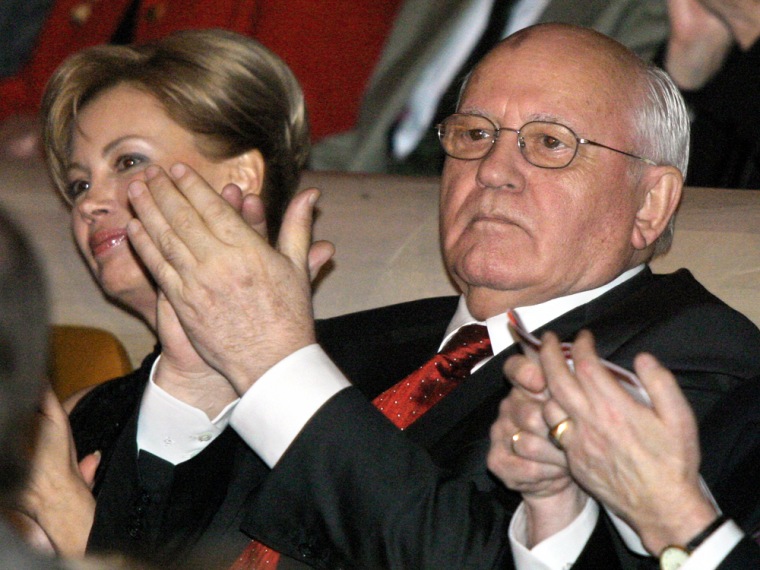MOSCOW — Mikhail Sergeyevich Gorbachev is perhaps the prime example of a prophet who is not revered in his own country. Even 15 years after he lost political power, he is still the man most Russians love to hate.
Opinion polls published on the eve of his 75th birthday on Thursday show one in every six Russian view his tenure as the Soviet Union's first and last president as a disaster.
Many Russians still hold him responsible for the fall of their once mighty Soviet empire and the poverty and hardships that accompanied his reforms.
Yet Gorbachev, who is arguably the man most responsible for ending the Cold War, seems unfazed by polls and numbers.
Gorbachev says he's unrepentant of anything he has done or said as Soviet leader except for one: "I regret not sending Yeltsin to prepare citrus plants in a banana republic," Gorbachev told the Moscow's Komsomolsakya Pravda newspaper.
From Satan to God
The former Russian leader won a mere one percent of the vote in the 1996 presidential election; and he hasn’t run since.
But Viktor Kremenyuk, deputy director of of the Moscow-based think tanks, the USA-Canada Institute, said Gorbachev made history.
“Gorbachev has changed the world. He just made the world peaceful. He has given a future, perspective for the world, and, I say, he has given hope,” Kremenyuk said.
But even the former leader acknowledges that not all Russians would agree.
"I stumbled on a book, 'The King of Darkness,' in my countryside home recently,” Gorbachev told the Komsomolsakya Pravda newpaper. “It is about me. But I also found a tattered newspaper article ... where I was described as God-sent. Here goes the range of opinions: from Satan to God's emissary."
Overall, Gorbachev is optimistic about his place in history.
“Attitude is changing,” he said during an interview with Russia’s State Television RTR. “Ten years ago, polls say 45 percent did not support perestroika. Last year, it's only 31 percent against."
Gorbachev said that although his monthly pension of a little over $1,000 is nothing to write home about, he is able to maintain a relatively luxurious lifestyle because of demand for his services outside Russia. "I receive decent pay for my lectures and appearances. Only a few, like President Clinton, get paid the way I am,” he said in the Komsomolsakya Pravda interview.
Fair share of critics
Many still accuse him of caving in to the West. Anatoly Utkin, a senior researcher with the U.S. and Canada Institute, a Russian think tank, chastized Gorbachev for drastically cutting Soviet nuclear arsenals and agreeing to Germany’s reunification without getting anything in return.
“Gorbachev didn’t know the West. And the West didn’t trust the nobility of his motives and coldly used him,” Utkin said in a column in the weekly Argumenty i Fakty.
Gorbachev’s record as a man who gave freedom to his land also was tarnished by some darker epidsodes.
One was his handling of the 1986 explosion at the Chernobyl nuclear plant, which the Soviet leadership announced to the world only after scientists in Sweden detected radioactive fallout.
Gorbachev insisted the Kremlin just didn’t know the scope of the disaster, but many claim the Soviet leadership deliberately downplayed its gravity.
He is also blamed for a Soviet troop crackdown on demonstrators in Lithuania in 1991 that killed 14 and injured nearly 1,000.
Gorbachev said the troops were sent against the protesters on a secret KGB order of which he was unaware, a claim his foes shrug off as improbable.
Relations with the Kremlin have improved
Gorbachev still bristles when he talks about the betrayal by his communist lieutenants who launched the August 1991 coup that briefly ousted him. The coup collapsed within days, encouraging the Soviet republics to declare independence and shattering Gorbachev’s hopes of keeping them together in a looser federation.
Looking back at the turmoil that preceded his resignation, Gorbachev says he has never regretted his refusal to turn to military force to prevent the Soviet collapse. He said that sometimes his “hands were itching” to use force, but he realized that could have led to a civil war and even a global nuclear conflict.
Gorbachev said this week that while he could have ended former Russian President Boris Yeltsin’s political career easily by dispatching him as ambassador to a distant country, he didn’t do so because such a move would have compromised his principles.
Yeltsin later humiliated Gorbachev by giving him just a few hours to clear out of the presidential office after he signed the Soviet Union out of existence on Dec. 25, 1991. He never invited him to the Kremlin afterward.
Gorbachev’s relations with the Kremlin have seen a marked improvement under Vladimir Putin, whom he has praised repeatedly for ending some of the the political chaos and economic decline of Yeltsin’s era.
Happy, but missing Raisa
Gorbachev is still as ebullient as ever. His trademark hand language is present on all his TV appearances to mark his birthday.
To celebrate his big day, some 250 people were invited to a dinner in a Moscow restaurant Thursday evening, among them former German Chancellor Helmut Kohl and ex-German Foreign Minister Hans Dietrich Genscher.
Gorbachev said he would miss the company of former President George H. Bush, who was unable to attend the party, but promised to send a video-taped congratulatory message. Also absent was former British Prime Minister Margaret Thatcher, who could not attend because of her health.
And is he a happy man at 75?
"People often say there are no happy reformers," Gorby told Komsomolskaya Pravda. "Maybe so. But I consider myself a happy man. If only Raisa Maksimovna [his late wife] was by my side today."
